Rye Barcott's Blog, page 20
December 19, 2013
Support CFK with Your Morning Coffee!
If you own a Nespresso machine, now you can support CFK just by drinking your morning coffee!
Our friends at HiLine Coffee Company,  who make and sell capsules that are compatible with Nespresso machines, have chosen to partner with CFK by donating some of their proceeds to scholarships for students in Kibera. A small business based in New York City, HiLine has its own community-oriented, grassroots spirit from having to compete with global coffee giants like Starbucks or Nespresso itself. And they’ve decided to give back.
who make and sell capsules that are compatible with Nespresso machines, have chosen to partner with CFK by donating some of their proceeds to scholarships for students in Kibera. A small business based in New York City, HiLine has its own community-oriented, grassroots spirit from having to compete with global coffee giants like Starbucks or Nespresso itself. And they’ve decided to give back.
Why CFK — and why scholarships? They explain on their website:
“In Kibera, many families live on one or two dollars a day, and school is an unattainable luxury. Girls who cannot afford tuition are forced to leave school and work, or in some cases marry at a young age. The Scholarship Program ensures that a family’s material circumstances do not limit a student’s ability to excel in school. None of the scholarships provides full awards. Families share responsibility for fees as a demonstrated commitment to students’ academic success.
“The Scholarship Program offers more than just school fees. It fully invests in student development, providing mentorships, counseling, tutoring, career panels, study skills and community service. In 2010, its first year, the Scholarship Program awarded 307 scholarships to primary, secondary and post-secondary students from Kibera.”
Visit their website to read more about why they chose CFK as a beneficiary — and to buy some delicious coffee.
December 3, 2013
Education in Action: Effie’s Story
In Kenya, going to school can be confusing and frustrating—or at least, paying for it can be. Students and their families often worry about finding money for school fees that can increase dramatically from one year to the next. Uncertain about their future, students can lose motivation as their delinquent fees pile up. In short, getting a school scholarship takes a huge burden off their shoulders.
This situation is typical, especially for residents of Kibera. Take Effie, for example:
As many young Kenyans do, Effie moved from her rural home in Western Kenya to Kibera in Nairobi to access educational opportunities that were beyond her reach. Back home, Effie’s mother is raising eight children on her own. While subsistence farming feeds the family, there was no money for education.
But Effie’s ambition to go to school drove her to find a way to pay for it. Shortly after arriving in Kibera, where she lives with her uncle, she applied for and won a CFK scholarship for secondary school. Now, she is a junior in high school with only one more year left before graduation. Effie will be the first in her family to graduate from high school, including of all her siblings and even her parents.
But Effie is just getting started. She has already begun using her skills to actively pursue her life’s passion to educate others about the importance of family planning.
Her passion comes from a very personal place. After watching her mother struggle with such a large family, and also after seeing the difficulties of other mothers who aren’t able to meet the basic needs of their children, Effie started speaking to expectant mothers—and anyone who would listen—about the importance of thoughtful family planning. Effie’s mother supports her daughter’s work, admitting that while she loves all her children, she wishes she had heard more about family planning methods in the past. When asked if there is a “right” amount of children families should have, Effie said, “If you can take care of your children’s needs then even ten children is great.” It’s clear to Effie that the question isn’t about the number in a household but about everyone being adequately cared for and supported.
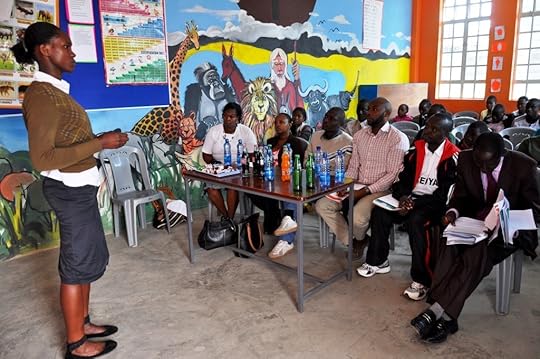
Effie gives a presentation on her work reaching out to community members about thoughtful family planning.
Convening a group of five young women from all corners of Kibera, Effie and her team work to get the message out to women and men. Through CFK’s partnership with Ashoka’s Youth Venture program, Effie has now been able to access support for building her family planning project and herself as a community change-maker.
With encouragement from both CFK and Ashoka staff and volunteers, Effie continues to speak with Kibera community members about family planning. She admits the work is tough, acknowledging that “men say it’s hard to find condoms, women are afraid family planning methods will make them sterile and many people continue to believe that having lots of children will contribute to a family’s future security.” Because she does not have to worry about finding ways to support her education, she can focus on doing well in school and educating others about the things she cares about most.
November 8, 2013
Meet Stella, CFK’s New Head of the Economic & Entrepreneurship Department
Stella Sigana understands how difficult it is to make it as an entrepreneur. After graduating from Egerton University with a Bachelor’s Degree in Clothing, Textiles and Interior Design, Stella tried to launch her design business, but quickly realized, “I knew how to produce, but not how to manage.” This realization led Stella to pursue a Master’s Degree in Entrepreneurship Development, where she learned that she wasn’t the only one who lacked the business knowledge needed to make it. Upon meeting many artisans who “had the hands-on skills” but needed help with the business side of things, Stella found a new calling. “I want to help them develop their products and become empowered through their businesses.”
Working with a range of organizations across Kenya, including the British Council and the GoDown Arts Centre, Stella has trained designers, artists, handcraft artisans, dancers, web designers and photographers in product development, entrepreneurship and marketing. Additionally, Stella has helped organizations develop customized business training curricula to suit the community involved. While business training and product development for others has become her full time job, Stella still does design work as a hobby.
After joining the CFK team in October, Stella said, “I’m excited and very interested in all the activities going on. I’m excited to get to interact with key stakeholders in the community and to give the opportunity of business to people who don’t usually get these opportunities. We need to get Kenya to the place where people appreciate design and the work of ‘semi-skilled,’ talented people. It’s already started, as the language has started to change for certain words, such as ‘tailor’ changing to ‘designer’ and ‘clothing’ to ‘fashion.’ The same needs to happen in the artisan world.”
We are so thankful that Stella is eager to work with CFK, and we welcome her to the CFK family!
My Day with Daniel
By: Nick Johnson, CFK Staff Associate
—
Walking around Kibera is treacherous and tough, both physically and mentally.
Physically, it’s almost an athletic feat. To get from here to there, you have to focus on your footing as you jump over stagnant sewage sumps running between houses. You have to watch out for children quickly cutting corners, lest they knock you over. You have to shield your eyes from dust blowing in your face. It’s impossible to navigate without someone who knows their way around.
Mentally, you have to try to process the fact that people live in tiny, ramshackle houses squashed end to end. You have to try to ignore the putrid smell. It’s hard to understand how people have the patience to be so nice and courteous to you as you haphazardly move through such an unfamiliar environment. It’s hard to fathom how things could ever change or improve.
But things can change, and things can improve.
Right in the middle of my 12-day visit to Carolina for Kibera’s office in Kibera, Kenya, I spent a day traversing Kibera’s narrow corridors with Suzanne, CFK Organizational Consultant, and Daniel, a project officer for CFK’s Economic & Entrepreneurship Department (EED). Daniel works with Trash Is Cash (Taka ni Pato), a community-based initiative to clean up Kibera that helps incentivize participation by supporting small businesses and youth groups that seek to make money from trash.
As the saying goes, one person’s trash is another’s treasure. Daniel took us to visit several youth groups who had started businesses to help manage waste in their community—but maybe not in ways that you might think. In case you aren’t familiar with some of these CFK-sponsored small businesses in Kibera, here are a few that I met:
![John - Victorious [re-size]](https://i.gr-assets.com/images/S/compressed.photo.goodreads.com/hostedimages/1384110951i/6778590._SX540_.jpg) First, there’s the Victorious Youth Group, led by John (pictured right). They buy leftover bones from slaughterhouses, clean them, shape them, glaze them, and make them into jewelry and household items. Bracelets, rings, necklaces, hair pins, even bottle openers—they have a wide selection of beautiful, unique, and practical creations of all kinds.
First, there’s the Victorious Youth Group, led by John (pictured right). They buy leftover bones from slaughterhouses, clean them, shape them, glaze them, and make them into jewelry and household items. Bracelets, rings, necklaces, hair pins, even bottle openers—they have a wide selection of beautiful, unique, and practical creations of all kinds.
There’s the Recycling Center, where workers gather piles of garbage and sort through them for items made of plastic. Then they run the materials through a machine which dices them into little pieces that they can sell back to factories for a fee. Batches of these pieces must be a whopping 4 tons before the factories will accept them.
There’s Fruitfull Talent Women’s Group, led by Beatrice (pictured at top). They make necklaces and bracelets from beads—some bought, some home-made from recycled paper—and sell them in the market downtown every Saturday. They also create collages of animals and tribal villages from organic materials like grass and banana fiber, and they help to promote Victorious’ work as well by selling some of the group’s pieces and telling customers about CFK. Purchases go towards growing their business, but Fruitful Talent also contributes some proceeds to classes for preschool kids at the makeshift school next door.
There’s Zero Waste, a group whose name reflects the amount of waste they produce when making their products—zero. They collect bags of all different colors from the street and make them into purses, tote bags, coasters, rugs, and chairs. Among their selection, I even saw a purse completely made of the thread from damaged cassette tapes. Whoever said those were obsolete?
There’s also Usafi, a group that makes briquettes using organic material (paper, grass, dust) as a clean alternative to charcoal. Not only are these briquettes cleaner to burn, but with the right recipe, they have the potential to be more long-lasting and therefore more cost-effective than the typical charcoal sold by roadside shops.
Some necklaces and bracelets made by Fruitfull Talent.
![Victorious' Wares [re-size]](https://i.gr-assets.com/images/S/compressed.photo.goodreads.com/hostedimages/1384110951i/6778592._SX540_.jpg)
Some of Victorious’ creations, including bracelets, rings, and decorative key chains.
When I asked Daniel how these and other groups and businesses get started, he told me that they don’t begin with a mission to make money. Instead, they focus on how they can help their community. Youth first identify a problem specific to their village, then they devise a solution that is both financially and environmentally sustainable.
Where there’s a lot of recyclable plastic carelessly tossed to the ground, a recycling center is born. Where plastic bags line the streets, people start collecting them to make into accessories. Where there’s excessive pollution from burning trash and charcoal, clean briquettes are sold. Where there’s a problem, creative and driven youth will find a solution.
 But they frequently seek support. “That’s where CFK comes in,” explained Daniel (pictured right). “We support them by offering trainings on entrepreneurship, financial literacy, and proper business models – and anything else they want to know to help grow their business.” These trainings help fortify and expand small businesses to make an even bigger impact, not just on the owners’ own lives but throughout their community as well. Daniel added, “Each person who starts a youth group knows the problem that most affects their neighborhood. Whatever it is, they find a way to make it better.”
But they frequently seek support. “That’s where CFK comes in,” explained Daniel (pictured right). “We support them by offering trainings on entrepreneurship, financial literacy, and proper business models – and anything else they want to know to help grow their business.” These trainings help fortify and expand small businesses to make an even bigger impact, not just on the owners’ own lives but throughout their community as well. Daniel added, “Each person who starts a youth group knows the problem that most affects their neighborhood. Whatever it is, they find a way to make it better.”
While the environment of Kibera can be jarring for outsiders like me, those that live there can see opportunity in even the most unbecoming things. The members of these CFK-endorsed youth groups are also resourceful and environmentally-conscious, two qualities that help their businesses flourish and turn trash into cash. And with people like Beatrice, Jack, and Daniel leading these groups, change can be made, one piece of trash at a time.
October 8, 2013
Interview with CFK Volunteer Liz Hall
Liz volunteered in Kibera during the summer of 2009. She worked with Taka ni Pato (Trash is Cash), a community-managed solid waste management and recycling program. She worked with women’s and youth groups specifically to create small businesses that reuse and recycle material found locally in Kibera. After volunteering with CFK, she spent a year in the Republic of Congo where she researched gorillas and elephants for the Wildlife Conservation Society. This fall, she will start a Ph.D. program in Anthropology at Purdue University. We reached out to her about the time she spent in Kibera and received a response that was so wonderfully detailed that we wanted to share all of it.
—
CFK: How did you get involved with CFK?
Liz: I found out about Carolina for Kibera through the Duke Global Health website while I was looking for a summer internship to fulfill my Global Health certificate requirement. CFK’s mission seemed to share the exact sentiment I felt toward development and its relationship with conservation and public health. I really appreciated CFK’s approach toward and dedication to community development. I also loved how involved and dedicated CFK remained with the community; it definitely wasn’t a suitcase NGO like so many people complain about in developing nations.
CFK: Why did you get involved with CFK?
Liz: I got involved with CFK because of my strong interest in the interface between conservation and development, particularly in developing nations in Africa. I realized in college that conservation is so much broader than just preserving forests and protecting animals. Multidisciplinary and cooperative approaches to conservation and development have recently been promoted and encouraged by NGOs, government programs, and academic institutions, but at the time it felt like wildlife conservation and urban development were thought of as two separate, non-intersecting disciplines. I wanted to shift my focus toward how the two interacted and how researchers could promote both development and conservation together, improving both in tandem and using strategic approaches to solve issues on one side without thwarting efforts on the other. In addition, I felt that the relationship between the two had an incredible impact on public health and wanted an opportunity to learn more about the interactions between the environment, human health and behavior, and urban development.
CFK: What projects did you work on while you were in Kibera?
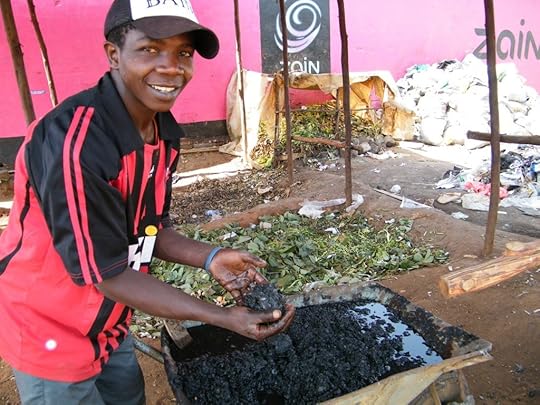 Liz: I worked with Taka ni Pato, a branch of CFK that supports community members who are trying to create sustainable job opportunities through the promotion of recycling and environmentalism. Specifically, I worked with women’s and youth groups in Kibera to create small businesses that reused and recycled locally-available materials (i.e. paper, beads, string). Most of the women’s groups I spent time with were developing business plans to create and sell greeting cards made from recyclable paper. The youth groups were modeling a business to make and market briquettes, an alternative fuel source to charcoal made out of recycled materials. My role was to help provide any support the groups needed, whether it was conducting small courses on business management or helping promote the businesses by speaking to local organizations and other businesses that might have been interested in investing in or purchasing the products.
Liz: I worked with Taka ni Pato, a branch of CFK that supports community members who are trying to create sustainable job opportunities through the promotion of recycling and environmentalism. Specifically, I worked with women’s and youth groups in Kibera to create small businesses that reused and recycled locally-available materials (i.e. paper, beads, string). Most of the women’s groups I spent time with were developing business plans to create and sell greeting cards made from recyclable paper. The youth groups were modeling a business to make and market briquettes, an alternative fuel source to charcoal made out of recycled materials. My role was to help provide any support the groups needed, whether it was conducting small courses on business management or helping promote the businesses by speaking to local organizations and other businesses that might have been interested in investing in or purchasing the products.
CFK: What was the most meaningful thing that you took away from your time in Kibera?
Liz: My experience working with CFK and in Kibera in general was my first real exposure to cross-cultural exchange. I had studied abroad in South Africa the previous semester, but it was an American program and did not challenge me to work outside the context of my own cultural norms and comfort zone. I think one of the greatest things I got out of my time with CFK was a better understanding of what it means to collaborate with people in a sustainable way and effective way. I still grapple with how to respectfully embrace a culture while remaining true to myself and completing whatever tasks are at hand effectively, but most of the time I return to the lessons Carolina for Kibera taught me about being patient and truly listening to the needs of the locals. I often try to remember the importance of participatory development in sustainable nonprofit work.
 CFK: What did you do after you worked with CFK?
CFK: What did you do after you worked with CFK?
Liz: I’ve continued my work with conservation and development since my participation with CFK. I recently returned from a year in the Republic of the Congo, researching gorillas and elephants for Wildlife Conservation Society. This work required a lot of participation from local Congolese researchers and forest tribes, which proved sometimes incredibly difficult as I was often the only woman. I had to learn to work within the cultural confines of the region and navigate social norms while still holding true to my purpose for being there, skills that I started to develop while in Kibera.
CFK: What are you doing now?
Liz: I start a PhD program in Anthropology this fall at Purdue University. My main research focus is disease transmission between humans and wildlife (particularly between nonhuman apes and humans) in Central/West Africa and how it shapes conservation and development efforts in the area. My work is very sensitive because I’ll be living with a very small forest tribe in Central Africa Republic that thrives on bushmeat and is very distrusting of white people due to most scientists’ efforts to stop the bushmeat trade and many American/European business plans to log the forest and take many resources. (They’re also mistrusting due to the history of the area, of course.) I’m sure I’ll continue to develop the skills I learned through CFK as I try to transcend in a way the cultural boundaries and help improve public health and promote sustainable development in the area.
—
You can read about our current and past volunteers here.
October 3, 2013
A New, Permanent Space for Daughters United
“Will I become successful in the future? Will I finish my education? Who will listen to me? Why do I feel shameful about my body? Will we have supper tonight? Who can give me the support that I need? If I tell them what happened, will anyone believe me? These are some of the questions that girls in Kibera ask themselves continuously because of the poverty that they face.” –Zara Musa, 18
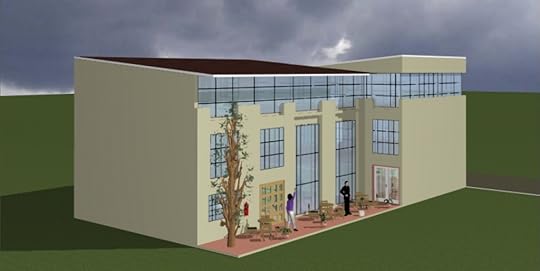
Proposed sketch of the new Binti Pamjoa Center (front of the building)
In Kibera, adolescent girls are marginalized and more vulnerable than their male counterparts. Because Kibera is a microcosm of many of the world’s most distressing issues — including poverty, the spread of HIV, gender-based violence, and lack of women’s rights—it is critical that girls have a safe physical and emotional place where they can express and develop themselves.
CFK’s Daughters United program (Binti Pamoja in Swahili) has been supporting girls for over a decade. Through several creative activities like group discussions, drama, photography, and others, the program gives young women space and confidence to explore the issues that they face. Since it was founded, the program has expanded to
reach over 1,500 girls each year. Now, we’re looking to expand even further.
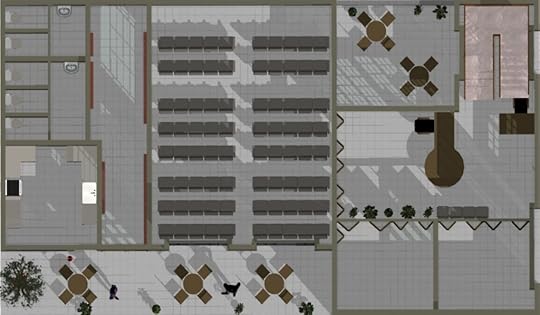
Proposed floor plan of the new Binti Pamoja Center (first floor)
Currently, the Binti Pamoja program’s main location
is a rented, one-story building. With the program’s growing need for space, the program leaders
decided it’s time for a step up. So, thanks to the support of the American Jewish World Service, CFK purchased a site that will serve as the home of a
brand new center for girls!
The new center will be a 3-story, multi-purpose building that is dedicated to the young women of the Binti Pamoja program. It will provide three times the space that the program has now, which can be used for classes, counseling, and arts activities. The girls were also involved in designing the building, making the center very much theirs and a place where they can thrive.
The new center will be more than just a building—it will be a testament to the rights and importance of young women in Kibera. It will demonstrate that safe havens for girls are needed, and that we believe in their power to help build their community. It will also be the first of its kind in all of Kibera, and perhaps all of Nairobi. In a place where girls are disregarded more than they are welcomed, their new center will help establish their place in the community and help them better their own lives.
Widespread, Yet Completely Preventable: Cervical Cancer in Kibera
By: Suzanne Thomson, CFK Organizational Consultant
—
On the homepage of the Prevention International: No Cervical Cancer (PINCC) website you find a statistic in bold type, “Cervical cancer kills 300,000 women worldwide each year, even though it is completely preventable.” Volunteers from PINCC repeated this statistic when they came to the Tabitha Clinic recently for a week of education and treatment for women, as well as training for community health workers, nurses and others. I’ve had many conversations about cervical cancer with Adah, a CFK nurse whose passion is encouraging Kiberan women to prioritize prevention of diseases through screenings and thoughtful family planning. You can see on Adah’s face how difficult the work is when she meets women who have developed the disease, especially knowing what we know now: that it is completely preventable.
Cervical cancer is extremely misunderstood in Kibera. In a survey CFK conducted to find out where the community’s thoughts were on this topic, many women said that they weren’t aware how the disease developed or that it was preventable. Other community members applied the myth they assume about all cancers: that these diseases only affect the rich because of their diet. Finally, there were some that felt the disease was a curse put on commercial sex workers. Because these myths are so widespread, CFK has been working to change perceptions of the disease and provide life-saving information about prevention and treatment.
To help with this, CFK and PINCC have partnered together for over a year and a half to spread the word among families in Kibera that it is possible to prevent cervical cancer. Recently, volunteers from PINCC (made up of gynecologists, nurses and administrative support) visited our team at the Tabitha Clinic for the third time to further educate clinic staff and the community and to offer free screenings and treatment of women with precancerous lesions. The team also trained CFK clinic staff on new methods for treating the early signs of the disease so that the staff at the Tabitha Clinic can continue to offer these services to women in the future.
PINCC’s most recent visit was a valuable learning experience for men, too. Erick Owenga, a representative of community news organization, Kibera Worldwide, wrote about his experience with PINCC, as well as the reactions of the other men present:
“To my surprise, while cervical cancer is a disease that affects women’s bodies, I happened to see many men attend the event as well. Personally, as a man living in Kibera, I felt the issue of cervical cancer is a collective worry that concerns everyone. Francis Odera, who is a Community Health Worker (CHW), talked about cervical cancer being a disaster to everyone, not only to the women, as it can impact everyone in a family if not caught early. ‘I cannot relax and must reach as many women as I can. The issue of cervical cancer is outrageous and I’m not forgetting that I have sisters, daughters and a wife that I need to remind on the matter.’”
While volunteers were present, the entire ground floor of the Tabitha Clinic was transformed into a reproductive health/treatment area. Four rooms were converted into screening areas for cervical cancer, with one room set aside for treatment of precancerous lesions. Women came from all over Kibera for the services, including many Binti Pamoja women and other CFK program participants and family members. In total 173 women were screened over four days. Eight women were diagnosed with high-grade pre-cancerous lesions that were immediately managed and removed, so doctors were able to prevent the development of cancer and save the women’s lives.
Having been trained in new methods of prevention, CFK and the staff at the Tabitha Clinic will continue to educate, screen, and treat the women of Kibera so that in the future, no women will have to develop this completely preventable disease.
To read about the partnership with PINCC, check out their blog on their visit: http://pinccorg.blogspot.com/2013/08/day-three-in-kibera-is-wrap.html
Learn more about cervical cancer on the PINCC website:
http://www.pincc.org/cervical-cancer/what-is-cervical-cancer
September 23, 2013
Our Hearts and Thoughts Go Out to Nairobi
We are deeply saddened by the events that have unfolded over the weekend in Nairobi. On Saturday, 10-15 attackers stormed into the Westgate shopping centre (an upscale mall located in the Westlands area of Nairobi) with guns and grenades. As of Monday morning, 68 people have been confirmed killed and more than 170 injured with the attackers in a stand-off with security forces. The situation continues to change, and we hope that a peaceful resolution comes soon.
CFK has been calling friends, staff, participants and partners across the city to make sure all are safe, and we believe that all are out of harm’s way. In those conversations, one sentiment is always the same, “This has affected everyone. Almost everyone knows someone who was there.” CFK continues to follow up with its networks and support one another through this tragedy. Our thoughts are with Nairobi as they work through this trying time.
To stay informed:
Daily Nation Kenya: http://www.nation.co.ke/news/Heavy-explosions-at-Westgate/-/1056/2003982/-/s41tigz/-/index.html
CNN: http://www.cnn.com/2013/09/23/world/africa/kenya-mall-attack/index.html
September 4, 2013
A Look at CFK’s Annual Soccer Tournament
By: Josh Gaskill and John Wirges, CFK Volunteers from Hampden-Sydney College
—
For the first Saturday of our internship this past summer with Carolina for Kibera, we were asked to go down to the Sports Association’s annual Girls’ Soccer Tournament to take some pictures. We both enjoy taking pictures, so we decided it would be fun. Our hope was that we could learn more about the community by engaging with an activity so universally enjoyed, and by actually getting to walk through Kibera and spend the day surrounded by what CFK does.
Before the matches started, CFK facilitators and volunteers engaged in a dialogue with the girls about puberty and maturity. One of the most remarkable things about CFK’s Sports Association is its ability to connect soccer with real community issues. For example, teams not only play soccer, but also participate in workshops like the one we were able to see.
After the workshop finished, the games began! The tournament consisted of sixteen matches played in a round-robin style. CFK gave all the players mandazi (doughnuts) and milk towards the end of the games, and the winning team got a trophy as well as notebooks and other assorted school supplies.
At one point, we got to go right on the field for a penalty kick, and it was incredible to see the excitement between the players as well as the energetic buzz in the crowd. It was clear that these girls were here to have an incredible time, and to help strengthen a community while doing so.
August 5, 2013
A Once-in-a-Lifetime Opportunity
By: Suzanne Thomson, CFK Organizational Consultant
—
It’s not every day that youth from Kibera get to travel to the U.S; in fact, the opportunity to do so is incredibly rare and usually comes at a cost. Getting there is a trial, one that involves a lot of paperwork, money, and what is considered to be a good reason for going. But I would say that being selected to compete in an international jump rope tournament is a pretty good reason.
This past July, Carolina for Kibera’s jump rope team, the CFK Sprinters, got the opportunity to go to Orlando, Florida to participate in World Jump Rope’s (www.worldjumprope.org) annual World Championship Tournament & Camp. Hosted at the University of Central Florida, the competition brought together jumpers from all over the world to learn from each other and compete in both individual and team events. With support from CFK partner, One World One Rope (www.oneworldonerope.org), along with your help, our jumpers from Kibera were able to travel to the U.S., and make friends with and compete against jumpers from countries like France, Canada, Tanzania, Japan, Brazil, and the U.S., to name a few.
The CFK Sprinters, about to embark to the U.S.! From L to R: Ida (11), Diana (13), Jackline (14), Coach David (22), Christine (13), and Margaret, Deputy Headmistress at Old Kibera Primary School. Photo by: Caitlin Kleiboer
Back in Kibera at the CFK office, we waited anxiously for any news coming from the tournament. It turns out that jumpers Ida (11), Christine (14), Diana (15), and Jackline (17) did remarkably well in their events, especially for a tournament of this magnitude. Diana placed 2nd out of 75 girls, aged 17 and younger, in her Individual Freestyle routine. Jump rope is a fairly young sport in Kibera; for Diana to place higher than many competitors who have been jumping for 7-10 years is a tremendous accomplishment! Ida and Christine both placed 6th in their age brackets for their Individual Freestyle routines as well, and all four jumpers placed 7th in their Double Dutch Pairs Freestyle routine. It is clear that all of their hard work and practice has certainly paid off, and we congratulate them on their results!When the team returned from the tournament a couple of weeks later, it took some time to catch up with Ida and the team’s coach, David, but we were finally able to sit down together during a cool, cloudy afternoon in Nairobi. When I excitedly asked them about their trip, they told me that the whole team had a wonderful time, especially during the skills camp with the other jumpers. Everyone on the team was very happy to have connected with new friends from other countries. And even though young Ida didn’t win a medal, she said that some of her new friends from around the world shared a medal with her.
Very happy and grateful to have had the chance to visit the U.S. and further hone their skills, the team was also happy to be back in Kenya where they are sharing their unforgettable experience and what they learned with their friends. Next time the CFK Sprinters get invited to a tournament, they will be even more prepared to show off their talent and learn even more.
Rye Barcott's Blog
- Rye Barcott's profile
- 7 followers


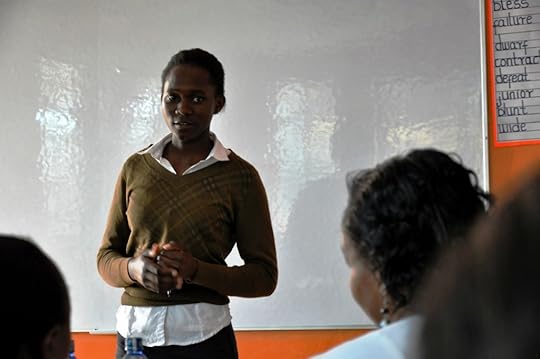
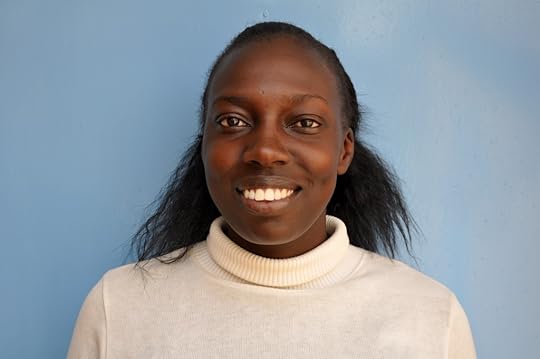
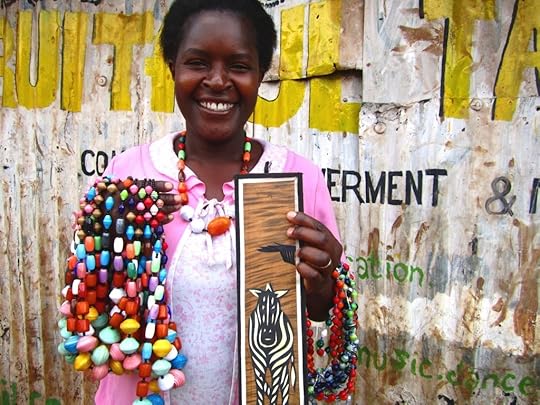
![Beatrice's Wares [re-size]](https://i.gr-assets.com/images/S/compressed.photo.goodreads.com/hostedimages/1384110951i/6778591._SX540_.jpg)
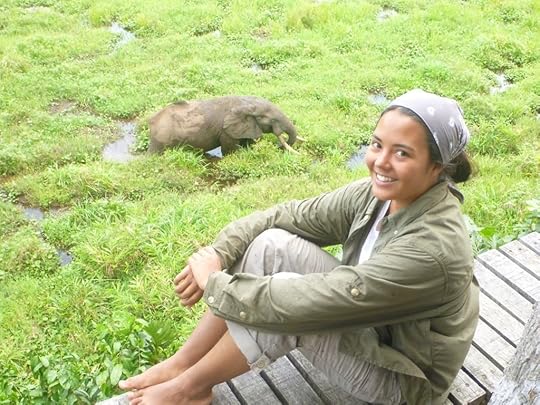
![239 [re-size]](https://i.gr-assets.com/images/S/compressed.photo.goodreads.com/hostedimages/1381317180i/4697397._SX540_.jpg)
![183 [re-size]](https://i.gr-assets.com/images/S/compressed.photo.goodreads.com/hostedimages/1381317180i/4697398._SX540_.jpg)
![193 [re-size]](https://i.gr-assets.com/images/S/compressed.photo.goodreads.com/hostedimages/1381317180i/4697399._SX540_.jpg)
![033 [re-size]](https://i.gr-assets.com/images/S/compressed.photo.goodreads.com/hostedimages/1381317180i/4697400._SX540_.jpg)
![095 [re-size]](https://i.gr-assets.com/images/S/compressed.photo.goodreads.com/hostedimages/1381317180i/4697401._SX540_.jpg)
![Jump_Rope_Group_Airport_Caitlin_Kleiboer [Edited]](https://i.gr-assets.com/images/S/compressed.photo.goodreads.com/hostedimages/1380990064i/3706466._SX540_.jpg)

